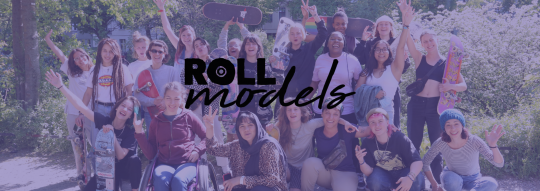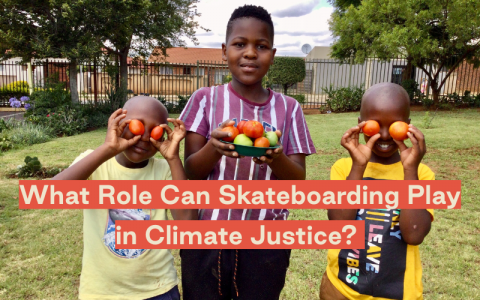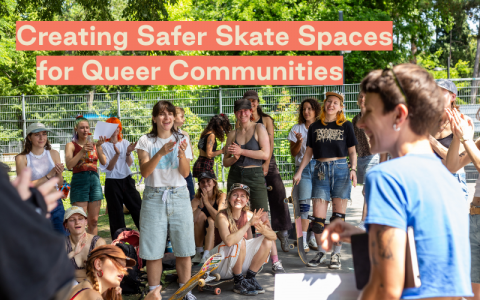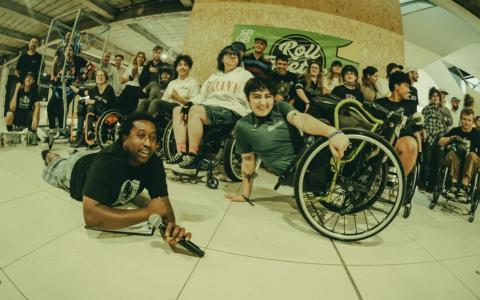This past May, 20 women and non-binary skaters from across Europe came together in Berlin to connect and share their project ideas before launching them this summer. After two years’ of adjustments due to COVID-19, we were finally able to host the ROLL Models Leadership Camp in-person and reap the benefits of connecting off-screen.
Introductions & Programme Design
We kicked off the first day of the Leadership Camp with a griptape design workshop. With the question in mind “What does inclusivity mean to you?”, each ROLL Model had the opportunity to explore this topic in a creative way — while getting to know each other at the same time.
In the afternoon, we covered the fundamentals of Skateboarding Programme Design, including an introduction to Monitoring & Evaluation by Women Win and a Child Protection workshop run by safeguarding virtuoso Vuyo Cekiso from the Skateistan South Africa team. Rounding off the first day, we had a brainstorming session in small groups to identify the common barriers affecting participation in skateboarding programs, community engagement, and outreach and retention of participants. We rotated the groups until everyone had contributed to the topics and shared their thoughts on best practices and solutions to challenges.
Skate Games, Inclusion & Skate Lesson Design
Skate games are a perfect way to warm up, build connections within a group and encourage participants to get excited for the lesson ahead —what better way to kick-push into the second day of the Leadership Camp? We began by asking the ROLL Models which of them are already implementing skate games within their sessions, what kinds of games they play and why they think they are beneficial.
Denia and Erato from Free Movement Skateboarding (Athens) shared that skate games can be a great way to engage a large group of participants all together — allowing sessions to run more smoothly when working in busy spaces. Lucia from Skatesencia Berlin added that they are also a great way to work with a group with varying skateboarding abilities so that everyone can interact and build their skills while taking part in the same activity.
The following three workshops were all about inclusion, focusing on how we can ensure our skateboarding programs are welcoming for all communities and how to ensure everyone feels comfortable once they are in your teaching space. Ilaria Naef (2021/2022 ROLL Model and WCMX rider) led a workshop on inclusion for people with disabilities — demonstrating how we can make skateparks more accessible and help to raise awareness of adaptive skateboarding and WCMX.
In the afternoon, we had the FLINTA* inclusion workshop led by previous ROLL Models Elja Krützfeld and Anabel Garcia (Solidariskate). FLINTA* is the German abbreviation for women, lesbians, intersex, non-binary, trans and agender people. In the first part of the workshop they focused on teaching the different concepts and terminology of FLINTA* and LGBTQIA*. In the second part, they held a group discussion on how we can be better allies to skaters that are part of the LGBTQI+ spectrum. Including using inclusive language and clear visual messaging.
With social skateboarding projects popping up in all corners of the globe, more and more initiatives are beginning to work with refugees, asylum seekers and migrants — reaping the mental health benefits and social cohesion that skateboarding programs can bring. Ruby Mateja (Free Movement Skateboarding, Skateistan) and Shiba Amiri (Skateistan / Stockholm Skate Nation) facilitated a workshop to discuss the intersectional barriers that might affect displaced people from attending skateboarding programs and to brainstorm practical solutions to tackle these issues.
Continuing the day’s theme of inclusion, we wrapped up the second day with a workshop on Skate Lesson Design, where we asked the ROLL Models to design a lesson plan responding to various scenarios focused on the inclusion of marginalized groups. A common thread throughout these sessions on inclusion was the importance of asking consent when it comes to offering support to people from marginalized communities. For example, offering to help someone in a wheelchair if they would like a push to get to the top of a ramp, rather than assuming that you are welcome to do so.
Thank you so much to everyone who attended and shared their ideas, experiences and hearts throughout the five days. We were reminded of just how important it is to come together in person to share and exchange. Not even a month has passed since we met and we are already seeing the impact of the knowledge and inspiration gained from the Leadership Camp! Now the 2022 ROLL Models will receive their seed grants and get started on running their own social skateboarding projects focused on the inclusion of girls, women and non-binary skaters.
Onwards and upwards, in the words of Iaria Naef: “We all have a space in the skateboarding community, and it is possible to make a change in your local community, even though it may seem scary or too hard in the beginning.”



